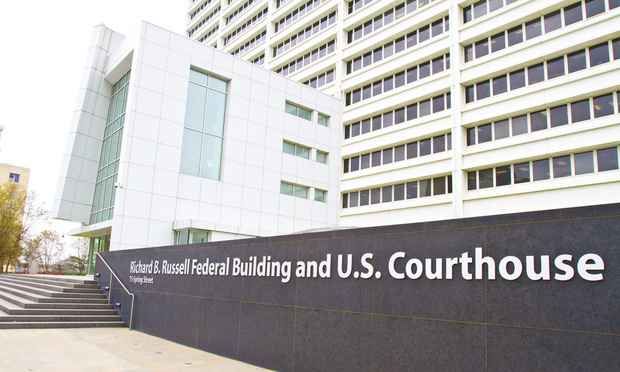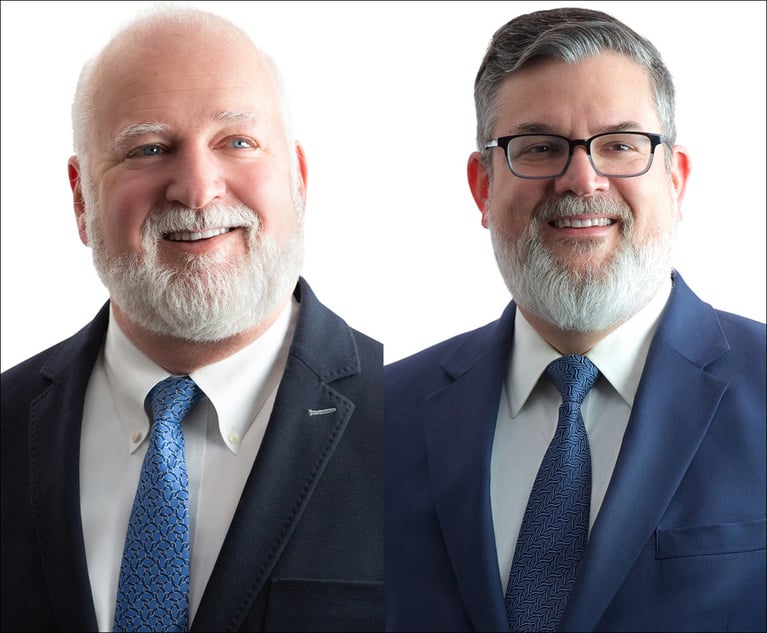Alleged Co-Conspirator a No-Show as Hardwick Prosecution Rests
Asha Maurya, the former controller for Morris Hardwick Schneider who pleaded to conspiracy to commit wire fraud, will not take the stand at Nat Hardwick's trial.
October 03, 2018 at 02:47 PM
7 minute read
 Richard B. Russell Federal Building, Atlanta (Photo: John Disney/ALM)
Richard B. Russell Federal Building, Atlanta (Photo: John Disney/ALM)
The government rested its case Tuesday evening in the embezzlement trial of Atlanta lawyer Nathan Hardwick IV after calling a potentially key witness: Fidelity National Finance executive Erika Meinhardt.
Meinhardt testified that Hardwick, a Fidelity title agent, sought an additional $1.7 million personal loan under false pretenses from the title insurer just as millions in escrow account shortfalls were discovered at his now-defunct residential real estate firm, Morris Hardwick Schneider. Fidelity ended up spending $29.5 million to cover the shortfalls.
Meanwhile, the most eagerly anticipated witness of the trial, Asha Maurya, will not be testifying.
Federal prosecutors indicted Maurya, the former controller for MHS's residential mortgage closing operation, as a co-conspirator with Hardwick, who is charged with stealing $26 million from MHS's escrow accounts. Maurya pleaded guilty to a single count of conspiracy to commit wire fraud last year and is cooperating with the government.
Hardwick's defense team, led by Ed Garland of Garland Samuel & Loeb, has maintained since the escrow shortfalls became public in August 2014 that Maurya, not Hardwick, was the culprit.
But the prosecutors did not call Maurya as a witness. Garland told Judge Eleanor Ross of the U.S. District Court for the Northern District of Georgia that he wanted to call Maurya as a hostile witness, but her lawyer, Page Pate of Pate & Johnson, said she'd invoke her Fifth Amendment rights and refuse to testify.
'Thief and Liar'?
Prosecutor J. Russell Phillips said in his opening statement last week that the government would prove that Hardwick is “a thief and a liar.”
“This is going to be a case about false statements from Nathan Hardwick,” Phillips said.
To the contrary, Garland told the jury, “Mr. Hardwick was deceived by Ms. Maurya. He didn't know she was a thief,” and added, “What a thief she was will astound you.”
Over seven days of testimony, the government called, among others, Hardwick's former equity partners, Art Morris and Mark Wittstadt, bookies, an ex-girlfriend, an FBI investigator and several of Hardwick's personal bankers and creditors to testify that he lied to them about his outstanding legal judgments and other liabilities.
The government has charged Hardwick with 24 counts of conspiracy to commit wire fraud, wire fraud and making false statements to financial institutions.
When the trust account shortfalls were discovered, Hardwick, who ran the Atlanta-based mortgage closing operation, owned 55.5 percent of MHS and brothers Mark and Gerard Wittstadt, who ran the default operation from Baltimore, owned 22.2 percent apiece.
'Desperate People Do Desperate Things'
Under questioning by Assistant U.S. Attorney Doug Gilfillan, Meinhardt testified that Fidelity, MHS's main title insurer, had made Hardwick a $3 million personal loan in 2005 through a subsidiary, Fortuna, to buy out a former law partner and merge their closing firm with Morris & Schneider, forming Morris Hardwick Schneider.
By August 2014, Hardwick still owed Fortuna $1.3 million and was delinquent on payments, said Meinhardt, who was president of Fidelity's national agency operations at the time.
When Hardwick asked her on Aug. 9, 2014, to increase his Fortuna loan by $1.7 million, he had a “sense of urgency,” she said, and told her he wanted the loan to buy out a minority law firm partner and acquire a Las Vegas business.
At that point a routine Fidelity audit of MHS's closing operation had uncovered an altered bank statement, but the title-insurer—and Meinhardt—did not yet know millions were missing from the escrow accounts.
Meinhardt told the jury that on Aug. 15 she was talking to her CFO about upping Hardwick's loan to $3 million when MHS's retired founder, Morris, called her cellphone with an urgent message. He told her there were “major defalcations,” in the escrow accounts—as much as $6.5 million.
Meinhardt testified that she told the CFO to forget the loan to Hardwick and caught the next plane from Fidelity's Jacksonville, Florida, headquarters to Atlanta. The shortfall estimate had ballooned to $30 million by the time she arrived, and Morris and Mark Wittstadt told her that “significant funds” had been diverted to Hardwick.
Hardwick requested a private meeting, Meinhardt said, and she asked Fidelity's Southeast manager, David Baum, to stand outside the door. “Desperate people do desperate things, and I was worried that Nat Hardwick was desperate at this point,” she told the jury.
“He kept claiming funds had been disbursed to him without his knowledge and were monies he thought he was entitled to receive,” she testified, adding that he blamed Maurya.
Meinhardt said she realized Hardwick had “lied to me” and “tried to increase the loan under false pretenses.”
“I was very angry he had attempted to dupe me and our company into giving him additional funds to help shore up the escrow accounts,” she said.
Forensic accountants had discovered disbursements from MHS's trust accounts to casinos at that point, Meinhardt said, and she asked Hardwick if he had a “gambling issue.” He told her he enjoyed gambling but did not “have a problem.”
Earlier in August, Hardwick had secured two loans totaling $5 million from his client, professional golfer Dustin Johnson, and local Atlanta businessman Jim Pritchard to cover the escrow account shortfalls, Meinhardt said, and he told her the Wittstadts knew he'd made MHS the guarantor.
That was also untrue, she said. Mark Wittstadt was “furious” when Meinhardt informed him that Hardwick had made the firm liable for the loans, she testified, and told her that he and his brother had forbidden Hardwick from doing that, telling him the loans were his “personal obligation.”
Investment or Loss Mitigation?
Fidelity agreed to retain MHS as a title agent and cover the escrow shortfalls. In return, Fidelity took a 70 percent stake in MHS's sister title company, LandCastle Title—later becoming its sole owner—and required Hardwick to exit the firm.
“If we let [MHS] shut down, I truly felt it would create a crisis in the residential real estate market in Atlanta and beyond,” Meinhardt told Gilfillan. MHS was one of the title-insurer's top 20 title agents out of about 5,000, she said, with more than 800 employees in 13 states.
Meinhardt testified that she asked Hardwick to resign and put half his shares into escrow, pending the Fidelity investigation's outcome, but he refused. After a call from Morris, he resigned the next day, Aug. 18.
On cross-examination, Garland suggested that Fidelity's stake in LandCastle was an opportunistic investment, since Fidelity gained a “valuable entity” and an entree into the Georgia residential closing market. What's more, he said, Fidelity got 40 percent instead of its usual 20 percent cut from the title insurance premiums issued.
“This was not a significant business opportunity,” Meinhardt replied, but instead loss mitigation, adding that Fidelity increased its title insurance cut in an effort to recoup the $29.5 million it ended up putting into the escrow accounts.
“This was probably the worst deal ever,” Meinhardt said, ultimately costing Fidelity $35 million plus lost market share. All that is left of LandCastle, she added, is a title search subsidiary, Title Wave, that has run at a loss since 2014. “It might make $200,000 this year.”
It's also been “a terrible personal strain—the worst time in my 36-year professional career,” Meinhardt said.
READ MORE: Hardwick Spent Law Firm's Millions on Jets, Gambling, GIrlfriends, Jurors Hear
Ex-Partner Tells Jurors That Hardwick Kept Him in the Dark
Hardwick's Ex-Partner Recounts Big Debts, Expenses in Embezzlement Trial
'A Thief and a Liar': Jurors Hear Accusations, Accounting as Hardwick Trial Begins
This content has been archived. It is available through our partners, LexisNexis® and Bloomberg Law.
To view this content, please continue to their sites.
Not a Lexis Subscriber?
Subscribe Now
Not a Bloomberg Law Subscriber?
Subscribe Now
NOT FOR REPRINT
© 2025 ALM Global, LLC, All Rights Reserved. Request academic re-use from www.copyright.com. All other uses, submit a request to [email protected]. For more information visit Asset & Logo Licensing.
You Might Like
View All

Sunbelt Law Firms Experienced More Moderate Growth Last Year, Alongside Some Job Cuts and Less Merger Interest
4 minute read
Fowler White Burnett Opens Jacksonville Office Focused on Transportation Practice
3 minute read
Georgia High Court Clarifies Time Limit for Lawyers' Breach-of-Contract Claims
6 minute readTrending Stories
- 1Big Law Firms Sheppard Mullin, Morgan Lewis and Baker Botts Add Partners in Houston
- 2Lack of Jurisdiction Dooms Child Sex Abuse Claim Against Archdiocese of Philadelphia, says NJ Supreme Court
- 3DC Lawsuits Seek to Prevent Mass Firings and Public Naming of FBI Agents
- 4Growth of California Firms Exceeded Expectations, Survey of Managing Partners Says
- 5Blank Rome Adds Life Sciences Trio From Reed Smith
Who Got The Work
J. Brugh Lower of Gibbons has entered an appearance for industrial equipment supplier Devco Corporation in a pending trademark infringement lawsuit. The suit, accusing the defendant of selling knock-off Graco products, was filed Dec. 18 in New Jersey District Court by Rivkin Radler on behalf of Graco Inc. and Graco Minnesota. The case, assigned to U.S. District Judge Zahid N. Quraishi, is 3:24-cv-11294, Graco Inc. et al v. Devco Corporation.
Who Got The Work
Rebecca Maller-Stein and Kent A. Yalowitz of Arnold & Porter Kaye Scholer have entered their appearances for Hanaco Venture Capital and its executives, Lior Prosor and David Frankel, in a pending securities lawsuit. The action, filed on Dec. 24 in New York Southern District Court by Zell, Aron & Co. on behalf of Goldeneye Advisors, accuses the defendants of negligently and fraudulently managing the plaintiff's $1 million investment. The case, assigned to U.S. District Judge Vernon S. Broderick, is 1:24-cv-09918, Goldeneye Advisors, LLC v. Hanaco Venture Capital, Ltd. et al.
Who Got The Work
Attorneys from A&O Shearman has stepped in as defense counsel for Toronto-Dominion Bank and other defendants in a pending securities class action. The suit, filed Dec. 11 in New York Southern District Court by Bleichmar Fonti & Auld, accuses the defendants of concealing the bank's 'pervasive' deficiencies in regards to its compliance with the Bank Secrecy Act and the quality of its anti-money laundering controls. The case, assigned to U.S. District Judge Arun Subramanian, is 1:24-cv-09445, Gonzalez v. The Toronto-Dominion Bank et al.
Who Got The Work
Crown Castle International, a Pennsylvania company providing shared communications infrastructure, has turned to Luke D. Wolf of Gordon Rees Scully Mansukhani to fend off a pending breach-of-contract lawsuit. The court action, filed Nov. 25 in Michigan Eastern District Court by Hooper Hathaway PC on behalf of The Town Residences LLC, accuses Crown Castle of failing to transfer approximately $30,000 in utility payments from T-Mobile in breach of a roof-top lease and assignment agreement. The case, assigned to U.S. District Judge Susan K. Declercq, is 2:24-cv-13131, The Town Residences LLC v. T-Mobile US, Inc. et al.
Who Got The Work
Wilfred P. Coronato and Daniel M. Schwartz of McCarter & English have stepped in as defense counsel to Electrolux Home Products Inc. in a pending product liability lawsuit. The court action, filed Nov. 26 in New York Eastern District Court by Poulos Lopiccolo PC and Nagel Rice LLP on behalf of David Stern, alleges that the defendant's refrigerators’ drawers and shelving repeatedly break and fall apart within months after purchase. The case, assigned to U.S. District Judge Joan M. Azrack, is 2:24-cv-08204, Stern v. Electrolux Home Products, Inc.
Featured Firms
Law Offices of Gary Martin Hays & Associates, P.C.
(470) 294-1674
Law Offices of Mark E. Salomone
(857) 444-6468
Smith & Hassler
(713) 739-1250






